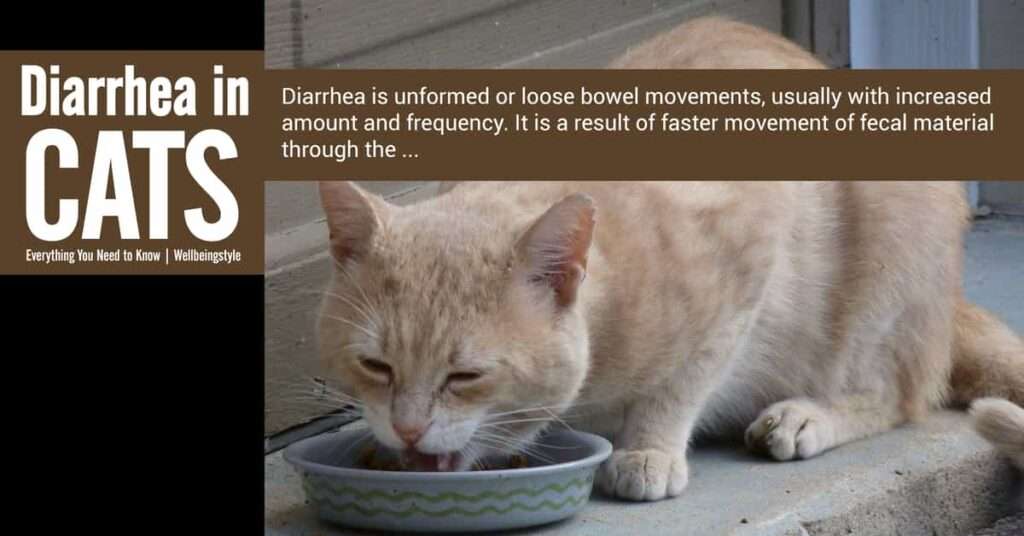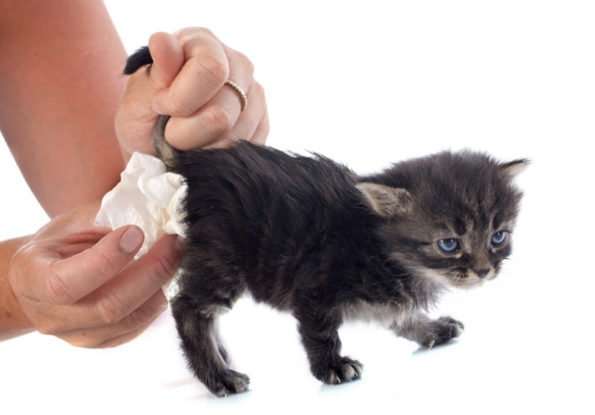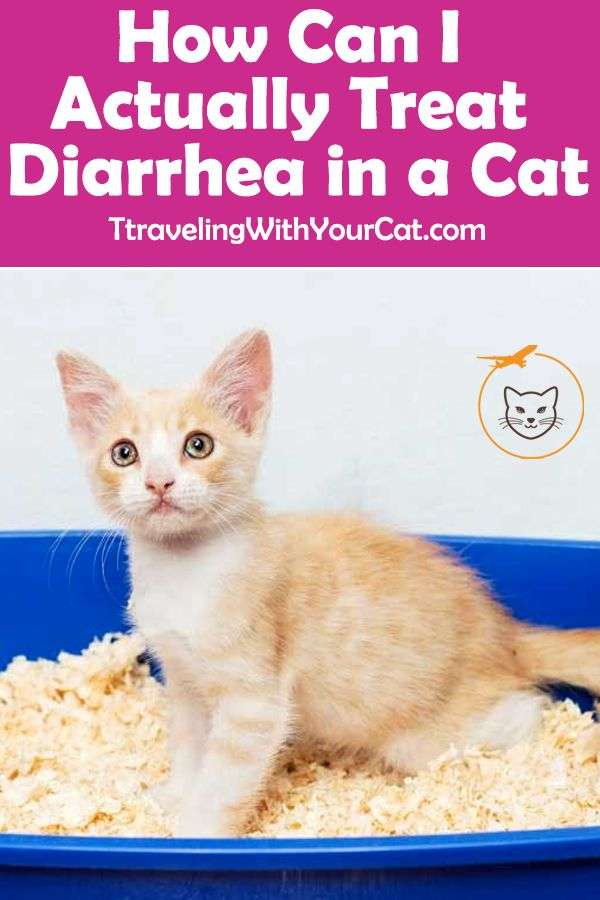Treating Diarrhea In Cats At Home
For mild cases of diarrhea, cat parents can try to resolve the symptoms at home. Ask your veterinarian before trying these at home remedies.
Try a bland diet. If your cat has mild diarrhea, try a bland, easily-digestible diet like canned baby food . Give small meals, about 1/2 a jar at a time, throughout the day and this simple change may stop diarrhea in your cat.;
Add fiber to your cats diet. Some diarrhea is fiber-responsive, meaning that adding fiber to your cats diet can resolve it. You can add a very small amount of a fiber supplement or one teaspoon of plain, canned pumpkin to your cats meals once a day.;
Reduce your cats stress. Since diarrhea in cats can be stress-related, help your cat relax. Provide your cat with places to hide and spend time alone. Add another litter box in a new location, a new water dish, and an additional scratching post or new toys. Consider a Feliway Adapter or spray to help calm your cat.;
*Do NOT give your cat Imodium or other medications that you might use yourself.;
Diagnosis Of Diarrhea In Cats
Your veterinarian may conduct a variety of tests to determine why your cat is suffering from diarrhea. The most common test involves taking a stool sample from your cat. The stool is then sent to the laboratory to be tested for infections, parasites, and other common feline diarrhea causes.
If your vet suspects that your cat could suffer from an underlying condition, he or she may perform tests like:
- Cultures
- Ultrasound
- Biopsy
The results of these tests will help your veterinarian diagnose the cause of your cat’s diarrhea and determine the best treatment for it.;
Causes Of Diarrhea In Cats
A variety of factors can lead to mild or severe diarrhea in cats. Mild feline diarrhea may be caused by:
- Dietary changes
- Food allergies
- Medication side effects
Severe cases of diarrhea in cats may be caused by more serious health complications or underlying conditions like:
- Bacterial or viral infections
- Parasites like roundworms, coccidia, or Giardia
- Kidney disease
- Cancer or tumors in the digestive tract
- Colitis
- Hyperthyroidism
Feline diarrhea that is caused by underlying health conditions or illnesses generally will not resolve itself. It may worsen and cause your cat to decline rapidly without proper veterinary care.
Also Check: How Much Should A Cat Eat Daily
Red Or Bloody Diarrhea In Cats
Bloody diarrhea is always concerning and should be addressed by a veterinarian as soon as possible.
Dark red or black discoloration of feces indicates upper GI bleeding and blood digestion.
Bright red coloration within the feces or coating the feces is a sign of lower intestinal tract bleeding.
Mucus-coated feces indicates possible dehydration or parasitic infection.
What Is The Prognosis

With minor cases of diarrhea, we expect improvement within 2-4 days of initiating therapy. If this does not occur, a change in medication or additional testing may be needed to further define possible causes. Please keep us informed of lack of expected improvement so that we may manage the situation properly.
Don’t Miss: How Cold Can Cats Be Outside
Can A 11 Year Old Cat Have Diarrhea
I dont like to see any cat suffering from diarrhea, but it can be especially difficult for senior cats to handle. When a senior cat has diarrhea, its most likely a sign of another ailment, such as pancreatitis, hyperthyroidism or stress.
Cat diarrhea is a common cause of this behavior, so if your cat has an abnormally soft stool outside of the box, then what you really need to focus on is the diarrhea. Conversely, constipation also can cause cats to defecate in inappropriate places.
Recent Posts
Why You Should Use Extreme Caution With Imodium
Imodium is a synthetic opioid. All opioids are known to cause constipation. They work by slowing down gut motility which allows for more fluid and salts to be drawn back into the body system.
It should only be given under the guidance of a veterinarian. The use in cats is extremely controversial and should only be used with extreme caution.
Imodium, when administered at safe levels, is not helpful for pain and, therefore, will not relieve any abdominal discomfort your cat may have.;
In some cases, it can cause extreme excitement in some cats. Additionally, it can cause respiratory suppression in some cats.
You should never give Imodium to your cat if:
Recommended Reading: Anaphylaxis From Cats
What Can You Do To Help Your Cat At Home
Is your cat bright, alert and behaving normally? If you have not seen blood in the vomit or diarrhoea, then you can often provide some supportive treatment at home:
- Do not starve your cat: withholding food is not appropriate because they risk getting a life-threatening liver condition called hepatic lipidosis. Research also shows that the gut needs contain food to start the healing and recovery process
- Hydration: your cat must have access to clean fresh water at all times
- Highly digestible diet: offer this in small portions little and often. For example, a prescription intestinal diet, such as Purina EN, or boiled rice or potato with cooked white fish, chicken fillet, turkey or egg
- Electrolytes and probiotics: use these feline supplements alongside their diet, following the manufacturers instructions. For example, Oralade GI Support Rehydration Fluid or Royal Canin Rehydration Support
- If your cat is an outdoor cat, keep them indoors, as long as this does not cause them distress, where they can be supervised for a few days so that you can monitor any vomiting or diarrhoea
Get To Know Your Cats Poop
To know whether or not your cats diarrhea is the sign of something more serious, its important to set the standard for what should be considered her normal litter box habits.;
Normal cat feces is deep brown, moist enough that litter sticks to it, and doesn’t feel too hard or too squishy. The smell, according to cat veterinarians at the American Association of Feline Practitioners , “emits an odor, that while not pleasant, should not drive you from the room.” While each cat is different, typically cats have bowel movements at least every 24 to 36 hours, sometimes twice a day. You know what’s normal and abnormal for your cat as you scoop the litter box at least once a day and see what’s there.;
Diarrhea happens when feces moves faster than normal through your cat’s intestines. Water and nutrients aren’t absorbed , so the final result can be a watery mess.;
This wet stool may be a pile with soft-serve ice cream consistency or a pool of liquid, or somewhere in between. VCA Hospitals put together a helpful chart that illustrates the different types of cat poop, so you can get a visual understanding of the variations in consistencies. You may also see blood or mucus in your cats stool, and while the details are unappetizing, your cat is counting on you to notice.
Also Check: How To Calm Down A Kitten
About Dr Sarah Wooten Dvm Cvj
A 2002 graduate of UC Davis School of Veterinary Medicine, Dr. Sarah Wooten is a well known international speaker in the veterinary and animal health care spaces. She has 10 years experience in public speaking and media work, and writes for a large number of online and printanimal health publications. Dr. Wooten is also a certified veterinary journalist, a member of the AVMA, and has 16 years experience insmall animal veterinary practice. To learn more, visit drsarahwooten.com.
My Cat Has Chronic Diarrhea Will It Get Better
Chronic diarrhea that has been present longer than two to three weeks may prove more difficult to diagnose and treat effectively. Even extensive work-up does not always provide a definitive answer to the problem. However, in most cases a thorough clinical work-up, including food trials, can result in successful management of the diarrhea.
Don’t Miss: How Many Calories Should A Cat Eat To Lose Weight
What Types Of Tests Are Performed To Find The Cause
If diarrhoea is chronic or is associated with systemic illness , we perform a series of tests to try and make a specific diagnosis. This allows for more accurate treatment. Diagnostic tests may include X-rays, blood tests, bacteriological cultures, biopsies of the intestinal tract, or exploratory abdominal surgery. Once the diagnosis is known, treatment may include special medications, prescription diets, or surgery.
If your pet needs professional veterinary attention, contact your local Greencross Vets.
When To Schedule A Vet Visit

Ideally, you don’t want your cat’s diarrhea problem to go on too long, and you should consider getting in touch with your vet if your cat’s diarrhea persists for more than 24 hours. You want to keep track of when the onset point was, what the frequency of the diarrhea is, the severity, and any possible causes like switching out their food.
Your vet will be able to give your cat fluids if they’ve gotten to the point of being dehydrated, and they can also suggest a treatment plan to help curb the episodes and severity of your cat’s diarrhea. If you notice that your cat’s;abdomen is tender or bloated, contact your vet straight away because this can be a sign of a dangerous health problem.
Recommended Reading: How Much Should A Cat Eat Daily
How To Stop Cat Diarrhea From Happening
One great first step in keeping your cat healthy , is ensuring your cat is up to date on vaccines, deworming, and current preventions says Dr. Michelle Burch DVM from Safe Hounds Pet Insurance. âPreventative care will help to prevent intestinal parasite infections and some viral infections,â explains Dr. Burch.
If your cat is prescribed to take an antibiotic, Dr. Burch recommends supplementing with a probiotic. âYou can speak with your veterinarian about a probiotic they carry in the hospital, or you can find one at your local pet store,â says Dr. Burch.
Shelter Cats And Diarrhea
In animal shelters, cats with diarrhea typically arent adopted out as quickly as healthy animals and are therefore more vulnerable to euthanasia. Read: this shelter cat with chronic diarrhea found a forever home and a solution to her digestive problems.
Because chronic diarrhea is such a serious problem for cats at animal rescues and shelters, we help support these organizations by offering product discounts and by periodically donating microbiome tests and supplements.
If you liked this article, please consider sharing it.
You May Like: String Of Hearts Plant Toxic To Cats
Why Does My Cat Have Soft Stool Outside The Box
Cat diarrhea is a common cause of this behavior, so if your cat has an abnormally soft stool outside of the box, then what you really need to focus on is the diarrhea. Conversely, constipation also can cause cats to defecate in inappropriate places.
Shes a 4-year old spayed female. Shes a mostly gray calico affectionately known as the Gray Menace. And trust me when I say its a well-earned nickname. Ive had her since she was about 1-year old and she has always had loose stools and poop that smells to high heaven.
The signs of diarrhea can be quite diverse in any age cat. Frequent, urgent pooping of loose, watery stools are the classic signs that your senior cat has diarrhea. And a cat who has a bout of watery poop and then continues to strain is not suffering from constipation; it truly is diarrhea.
What Are Some Causes Of Diarrhea
Diarrhea is not a disease in itself but a clinical sign that may reflect one or more of many different problems. Most involve some degree of inflammation of one or more areas of the gastrointestinal tract. The GI tract is the continuous tube that moves food from mouth to anus. Infectious agents, such as bacteria, viruses, coccidia, and intestinal worms, or non-infectious irritants, such as chemical toxins or poisonous plants are some of the more common causes of inflammation. Food intolerances or allergies to specific ingredients of a diet can also be responsible for diarrhea.
Recommended Reading: How Old Is A 12 Year Old Cat
Kitten Diarrhea: Common Causes Symptoms And Treatment
Much like human babies, kittens can be sensitive to sudden changes in environment or diet. They can even suffer from food allergies. These factors can cause diarrhea, a condition in which the kitten will release frequent, liquidy stools.;If you notice loose stools, you should monitor their bowel movements to make sure the condition is not chronic or a sign of a more serious problem.
When it comes to kitten diarrhea, it could be just a reaction to new foods, but it could also be a sign of a more serious, underlying illness.;
If your kitten is suffering from diarrhea, its not time to panic. Dr. Erick Mears, a BluePearl veterinary specialist who is board certified in internal medicine, points out that kitten diarrhea is usually a treatable condition.;Its pretty common and tends to be very responsive to treatment. Most of the time the things you look for are dietary causes or parasites, he says.;
How Will I Know If My Cat Has Diarrhoea
It can be difficult to notice diarrhoea in our feline friends especially if they share a litter tray with another cat or they go to the toilet outdoors. Look out for the following clues that your cat may have diarrhoea:
- Popping outside very regularly
- Using their litter tray very regularly
- Excessive bottom cleaning
- A general smell about them
- Straining to poo
You May Like: How Much Should A Cat Eat Daily
Your Cat Has Diarrhea: What To Do And Not Do
Author: Dr. Beth Turner
This page may contain affiliate links. We earn a commission for qualifying purchases at no cost to you. Our mission is to help save dogs’ and cats lives through our educational content. To help us create more veterinarian- and trainer-approved content, please consider buying one of our web-books for yourself or as a gift.
Just when you think nothing can be worse than waking up and the moment you get out of bed, you step on a cold, slimy hairball… oh wait… the smell hits you. It’s not a hairball. Your poor kitty has diarrhea and didnt make it to the litter box, or if they did, they painted the box with it. Please tell me this wasnt just my cats!;
If you have a cat, you will likely have to deal with diarrhea at one time or another. And in some unfortunate cases, it may be a regular situation. If left unaddressed, it could lead to dehydration and nutrient deficiency.
What Causes Diarrhoea In Pets

Diarrhoea is not a disease, but rather, a symptom of many possible conditions. Diarrhoea can be a symptom of gastrointestinal disorders like parasites, bacterial or viral infections, dietary intolerances, cancer, or inflammatory bowel disease. It could also be symptomatic of other conditions like liver disease, diabetes, or pancreatic disorders.
Some of the minor causes of diarrhoea include stomach or intestinal bacteria or viruses, intestinal parasites, and consumption of foreign matter . Noninvasive tests are performed to rule out certain parasites and infections. These cases may be treated with drugs that relieve inflammation in the intestinal tract, or a special diet for a few days. This approach allows the bodys healing mechanisms to correct the problem. If your pets condition doesnt improve, further testing will be required.
Don’t Miss: Are Umbrella Plants Toxic To Cats
Causes Of Vomiting And Diarrhoea
The reason for vomiting or diarrhoea is often due to irritation or inflammation of the stomach or intestines. Common causes include some viruses or that your cat may have eaten something inappropriate . Other reasons to consider are a foreign body that obstructs the intestine, intestinal parasites, poisoning, sudden dietary changes, salmonella , infection with feline parvovirus , pancreatitis, side effects of medication, or inflammatory gastrointestinal disease . Some cats may lose weight and become thin.
In acute cases of vomiting or diarrhoea it is not always possible to identify the cause. Often, these episodes will resolve by themselves or with supportive treatment. This typically involves feeding a bland, easily digestible diet , feline probiotics and electrolytes. However, for more severe cases, and for those that do not resolve quickly, it is important to seek veterinary treatment without delay. Treatment at the clinic may involve intravenous fluid therapy, anti-sickness medication and pain relief if required. Depending on the clinical signs, it may be necessary to take blood samples as well as x-rays or an ultrasound scan of the abdomen, to try to identify the underlying cause.
Treatment Of Diarrhoea And Vomiting
The vet will adapt the treatment depending on how sick your cat is and what symptoms they are showing. Blood samples may be taken to assess how dehydrated your cat is, the level of red and white blood cells, and whether internal organs are affected, including the liver and kidneys. Electrolyte levels will be checked, which are used to direct the appropriate fluid therapy. X-rays and/or an ultrasound examination may be indicated if your cat has abdominal pain or a potential foreign body.
If there is a clear underlying cause this can be treated appropriately. Otherwise, symptomatic treatment will be provided to reduce the secondary effects of nausea and dehydration. There is rarely any reason to give antibiotics to cats with vomiting and diarrhoea, unless there are signs of septicaemia , as they can disrupt the normal gut flora further.
Read Also: Wake Me Up Cat